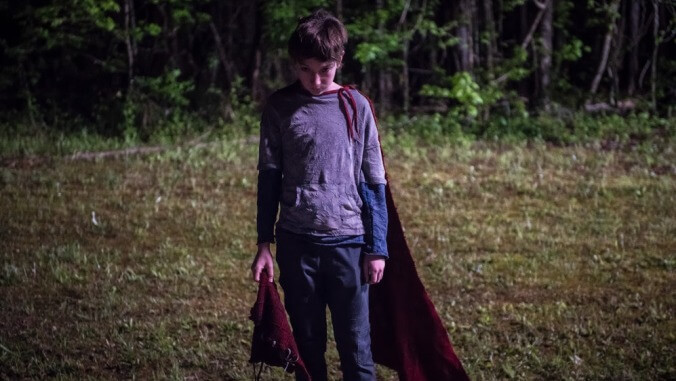Brightburn doesn't live up to its "Superman as bad seed" premise

In the years since the release of Man Of Steel, Zack Snyder’s version of Superman has been subject to a certain amount of distortion and oversimplification, appropriate given the distortion and oversimplification of Snyder’s clumsy superhero films. His Superman may not be a successful reimagining of the character, sure. But he’s clearly supposed to be a conflicted, complicated soul, not a humanity-loathing, mass-murdering font of anger. What the new horror movie Brightburn pre-supposes is: What if he was?
Just as it’s difficult to parse Snyder’s self-awareness about his own excesses and limitations, it’s hard to figure out whether his Dawn Of The Dead remake collaborator James Gunn has produced a pointed satire of Snyder’s point of view in Brightburn, or if he simply believes that Snyder should stop beating around the bush and embrace his Superman’s nasty side. Either way, Brightburn riffs heavily on that familiar origin story. Tori (Elizabeth Banks) and Kyle (David Denman) are a couple having trouble conceiving, so when a spaceship holding an infant crash-lands near their property, they decide to keep and care for the child as their own, naming him Brandon—a name which, combined with his adopted surname Breyer, gives him that classic comic-book alliteration.
The movie doesn’t actually show the Breyers’ first encounter with the alien baby; it cuts from the mysterious crash landing to video footage of Brandon growing up, finally winding up as a 12-year-old played by Jackson A. Dunn. But any attempts to obscure where the movie is headed are weirdly pointless, especially for a movie that goes heavy on the rumbling-score portent from the jump. For such a specific, clever-on-paper idea, Brightburn follows a shockingly predictable turn of events, possibly because it has few reference points beyond other pop-culture stories.
So yes, this a movie that cleverly positions the story of a Superman-like child discovering some Superman-like powers (flight, super-strength, and heat vision) as a bad-seed thriller, where doting parents can’t quite believe what’s gone wrong with their little boy. There are moments when the screenplay, by Mark and Brian Gunn (cousin and brother, respectively, to James), tries to position Brandon’s power flexes as a nightmarish metaphor for male adolescence, with aggression, fear, and a changing body making a particularly toxic combination. This is reinforced by their characterization of Brandon as a genuinely nice, normal kid before his change; though he’s drawn to his hidden spacecraft and clued into his powers by mysterious whispery noises, the movie doesn’t commit to making him a victim of hypnosis or alien programming. He succumbs to adolescent power fantasies because, well, he’s an adolescent.
The Gunns and director David Yarovesky seem so satisfied with this conceit that they feel comfortable retreating into horror-movie hokum, early and often. The most startling revelation of Brightburn is that having a stalker/slasher imbued with Superman-like abilities is not terribly interesting; the power-up gives Brandon the same mysterious disappearing/reappearing acumen as the ghosts in any given supernatural thriller. Throwing in some gnarly gore—and Brightburn indulges a couple of truly gruesome flinches—doesn’t change the plodding inevitability with which Brandon goes super-evil.
This might not matter if the movie had a modicum of wit or insight on its human side, but Banks and Denman are playing roles telegraphed so early that they lack any sense of discovery, with their spot-on semi-cool-parent costumes (flannel for him, dyed hair and faded rock-and-roll shirts for her) doing most of the work. It’s obvious right away that Kyle will be alarmed and afraid, while Tori will be determined to accept her son at almost any cost. Other characters will be considered expendable. Hell, most of the movie’s scenes seem to be considered expendable; the filmmakers repeatedly cut out of them abruptly, as if crossing them off a list.
By the horrific end of Brightburn, all that remains is the cleverness of its logline—and the growing suspicion that yes, Gunn and company are performing a feature-length dunk on Snyder (a brief during-credits sequence directly parodies a moment from Batman V. Superman). Like Brightburn’s concept, this ribbing makes more sense on paper than it does as an actual feature film. Man Of Steel, for all of its misguided action-climax hubris, saved some of its too-rare sensitivity for Clark Kent’s childhood, suggesting how the onset of superhuman powers might be at least as scary and confusing as it is thrilling. Brightburn just snickers like a bratty teenage gorehound.